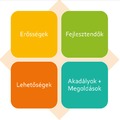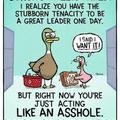GROW as a leader (as published in HelloToasties)
The main reason I initially joined Toastmasters was not to practice public speaking, but to develop leadership skills and to gain an overall insight into what makes a good leader.
I have been interested in the topic since I started my own company 11 years ago. Namely, as a freelance translator, interpreter and language coach I have had insight into more SME companies. After a while I realised I can develop a good relationship with some of them due to company policy and leadership mentality, while others usually give me a hard time strictly adhering to rigid rules and measures. Also, as the first entrepreneur in my family, I had no role models, no best practices and therefore was keen to figure it out for myself.
After a few years of running my small business, my children entered the public school system and I myself worked as a guest teacher for a few terms in prestigious high schools. I realised the leadership mentality is important not only for SME companies, but also for non-profit institutions. Namely, it sets the atmosphere of the workplace and the mindset of the associates. And where the wellbeing of future generations is at stake, those two can be crucial.
Later, when I did my business coaching course I realised I can help my clients struggling with low motivation and high fluctuation rate. I can provide them with tools they can later use in their own work environment, customised for their own employees. My main goal as a professional business coach is not to develop a relationship of dependency, but to enable my clients to develop a mindset of constant self-education, self-development and self-coaching.
My most successful case so far was with a freelance economist working for several SME companies, all of them in different industries. His main obstacle was continuous multitasking and loss of focus. While trying to motivate the business owners, he lost touch with his own routine and ways he kept himself inspired (reading, resting, digital detox, regular sports). This led to frustration and demotivation. As the old Asian saying points out: “One cannot offer anything from an empty bowl”. If you are a leader, your main responsibility is your own physical and mental health, because only then can you take care of people trusting you to lead them and the company.
On the first occasion we narrowed down the topics to three and then one he would like to prioritise. Setting the goal was more tricky, it took up another session, but it was well worth it. Namely, a well-defined, realistic, time-bound and attractive goal carries the dynamic of achieving it almost effortlessly. The third occasion was about empowering the client by making him realise he already has all the resources needed for him to thrive. He has the knowledge, the skills and the competence to carry out the work; he has also created an optimal work environment at his office and last but not least he has developed a relationship with his business partners built on trust and mutual respect. So what is missing then? This is what we explore on the fourth occasion, which is all about real opportunities, possible scenarios, making decisions about what next. This occasion is usually the clients’ least favourite as it takes them out of their comfort zone and makes them realise that what they regarded as “reason” is actually an excuse or a “story they have been telling themselves”. The last occasion is very straightforward, it takes the client to the resolution of their problem. In this case, it was a neat scheduling system with time slots saved for resting, others for detox and yet others reserved for efficient work.
Sometimes the solution is as simple as a very detailed time management system in which the clients can put all the activities they do in a day. Not only work, but family time, time spent with friends, and yes, me-time.
There could have been another scenario where my client prioritises one of the companies and streaming all his energies into it. Although it inevitably increases focus and efficiency, my client refused this option because in the long run he feared burn-out and lack of motivation. For him to be able to make such a determined decision he had to have self-awareness. Self-knowledge is the key to making hard decisions. Resilience is key to making those decisiones more flexible and not “for life”. And a business coach is key in being able to this facilitate this process in 4-5 occasions, and acquiring the tools to be able to do it independently when needed.
Nobody "needs" a business coach, it is not at the bottom of Maslow pyramid. But neither are we at this stage in the evolution. You need a business coach when you want to take the step from good to excellent.



